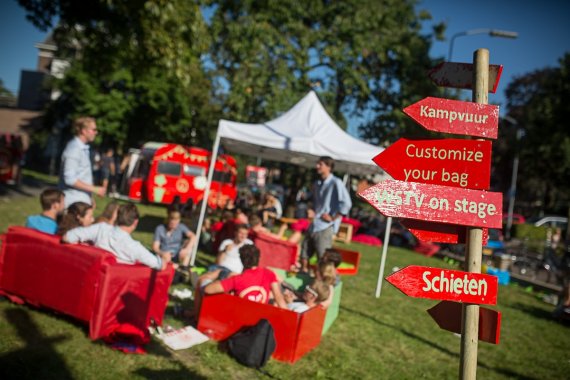Photo: At Wageningen University, teaching is done in both Dutch and English
**.**(Sven Menschel)
Of the AID participants who were asked, 27 percent saw the use of English as a plus. It would help them improve their command of the language and increase their chances of getting a job abroad. A further roughly 60 percent replied that English would not form an obstacle for them. They felt they spoke the language ‘well enough’, or saw the subject matter as the main factor in how difficult they would find their studies. Only 8 percent indicated that they would find being taught in English too difficult.
Rector Arthur Mol is not surprised by the outcome, and is pleased to hear that many students do see the opportunities. For Mol these include not just learning the language better but communicating with students from other cultures and functioning in an international environment. A good fit, says the rector, with ‘our strong international orientation and position’.
All Wageningen University’s Master’s programmes are already taught in English. But English has not yet penetrated the Bachelor’s degree programmes. The current
Code of Conduct Foreign Languages states that the first and second years are taught in Dutch, although the use of English in the second year is encouraged. In the third year, English is supposed to be the language of communication. The only exception is the entirely English-language BSc in Tourism. The education institute OWI can also make an exception for certain components of a degree programme.
This year a working group let by Harry Bitter, professor of Biobased Chemistry and Technology, has been studying the pros and cons of English-medium Bachelor’s degree programmes. Their advice is now with the executive board, which intends to take a decision in the next couple of weeks. Until then Bitter does not want to comment on the advice.
Wageningen Bachelor’s programmes vary a lot in their enthusiasm for a switch to English, says Tiny van Boekel, director of education institute OWI. Some of the programmes are very keen on the idea, while others see no need for it at all. Van Boekel can also imagine scenarios in which some of the Bachelor’s programmes are run in English. But one thing he does not favour is running parallel Dutch- and English-language tracks within one programme.
Special thanks to Carina Nieuwenweg and Edwin van Laar

